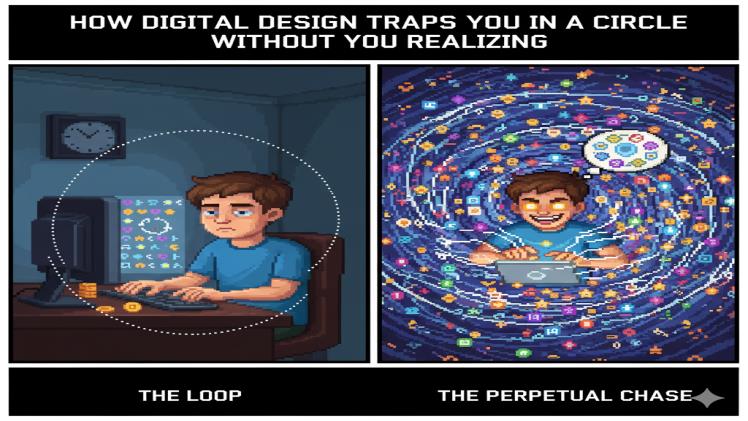
You have most likely opened an application 5 minutes ago, and an hour has disappeared. Or clicked on a game and, thinking, only once round, before you know you are spinning through level after level. It is not magic, or even mere self-control; it’s digital reforming quietly yet efficiently and leaving before real crealis you, such as those found at gambling sites like Dragon Slots New Zealand, the process may have an unfamiliar familiarity. Although we are not discussing gambling strategy here, the mechanisms are universal: the behavioural principles that make a slot machine interesting are the same as those that drive endless scrolling, app notices or interactive media.
The Feeling of Time Disappearing.
It boils down to attention capture and variable rewards. Digital platforms have perfected the feeling of urgency and anticipation: a notification rings when you want to be particularly curious, or a visual element signals a chance to win, and the feeling of rush comes with it.
It is not coincidental that your mind clings to these cues. Whenever you like, use a badge, or get any other little reward, your brain’s dopamine connections are engaged. And like the randomly awarded bonus spins in Dragon Slots New Zealand, these rare surprises make you keep going back to them in loops that you hardly realize.
The Brains Reward System at the Workplace.
The dopamine loop lies at the center of this involvement. Reinforcement is the variable referred to by behavioural economists and psychologists. It is the principle that makes us go through our phones one more time, and one more time, or that an hour-long game becomes a commitment. The human brain is programmed to pursue the next possible fulfilment, however small and abstract, even when it is a hit.
It is also fatigued with decisions. The greater the number of choices you make in the online setups, the less cognitive energy you are required to withstand the next stimuli. That is why a mere spin of the button within a game or an auto-video feed can be almost irresistible.
Habit Loops and Digital Triggers.
Designers are not using chance rewards alone; they also use habit loops: triggers, actions, and rewards that are repeated. A notification is a trigger. You click it–action–and you are rewarded with a micro-reward: a message, a new level, or a small win. In the long run, these loops create habitual behavioural patterns that keep you occupied and leave you without any thought.
These loops are closely followed in online gaming, including well-known websites such as Dragon Slots New Zealand. Bonuses, free spins, or special daily rewards can serve as triggers to keep it interested. Even a hope of a jackpot can be more inspiring than the reward itself.
Moving Rewards and Instant Satisfaction.
People are notoriously attracted to immediate satisfaction, especially when a touch of surprise accompanies it. Here is the place of variable rewards. Users are not accustomed to a specific result on each attempt; instead, they receive random wins or surprises. Consider the little but exciting wins in a game, the random alert that arouses interest, or the bonus rounds in online slots that keep you spinning.
The impact is huge: your brain is put between expectations and rewards, promoting engagement but not forcing it. And although this concept is the foundation of gambling design, it also applies to the broader digital ecosystem, including social media feeds and streaming recommendations.
Professional Point of View: The Rationale of Falling into Loops.
Even the minutest ones, such as colour ranges, sound, and animation effects, can make you act. There is controversy over the morality of such a design. Although users enjoy interactive experiences, there is a fine line between making them more engaging and developing obsessive digital behaviour. The first step is awareness: identifying triggers, knowing what you do, and the signals you follow can diminish the tendency to fall into these loops.
Online World and Mental Tendencies.
Social games, mobile applications, and interactive media, among others, which are not related to gambling, are based on the same principles. Small wins, micro interactions, and feedback loops reinforce behavioural patterns that develop from repeated interactions. The effect is increased by decision fatigue, which makes users more prone to prompts. The play might be different, but the mind responds the same way–a graceful movement of interaction that is both unseen and irresistible.
Identifying and Controlling Digital Circles.
To learn about these processes, you don’t need to sacrifice your favourite applications and games. Just knowing about dopamine-induced actions, changing reward loops, and decision fatigue enables you to be more conscious in your choices. Identify triggers: notifications, pop-ups, bonus clocks, or even a spin again trigger. After recognition, you can choose to either act on the issue or scroll by with a smile.
As a bright example, the website of the no deposit casino Dragon Slots New Zealand: its design principles do not force people to remain attentive, but rather appeal to human psychological tendencies. The ability to identify these propensities is empowering —it will change you as a person into a conscious consumer of your own online behaviour.
